Local Learning Hubs share experiences, boost GAD knowledge in first assembly
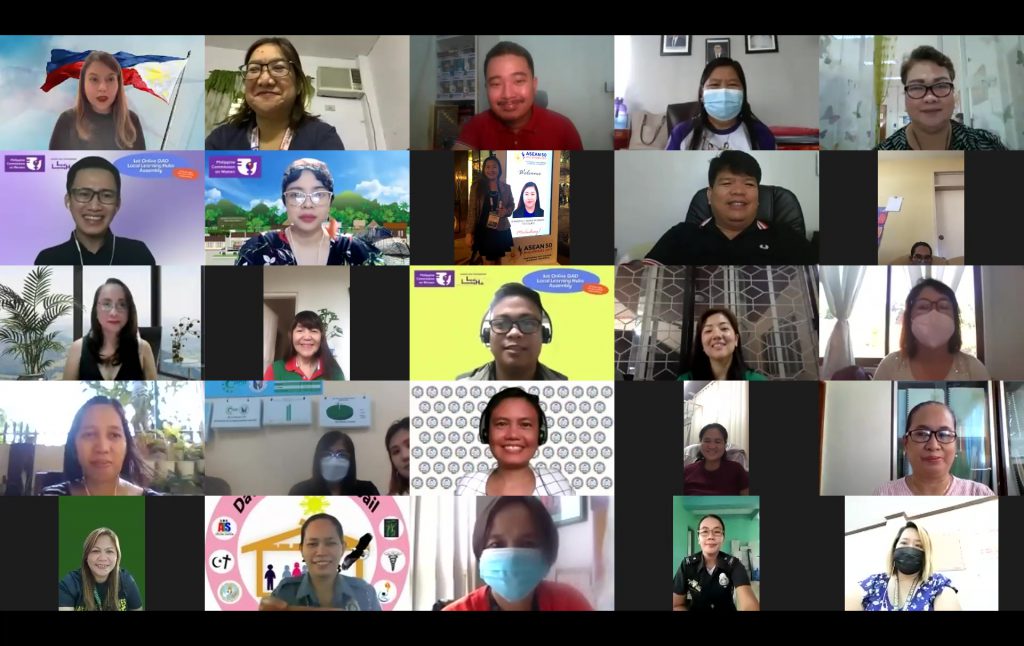
Determined to be exemplars of gender mainstreaming in their localities, 80 representatives from 12 local government units (LGUs) participated in the First Gender and Development Local Learning Hubs (GAD-LLH) Assembly organized by the Philippine Commission on Women (PCW) on October 28, 2021.
The virtual assembly served as a venue for the participants to learn and draw inspiration for the continuous operations of the GAD-LLH in their respective LGUs. The session refreshed the eager participants on gender analysis tools that can increase their knowhow on GAD and reignited their appreciation of the significance of maintaining gender-responsive programs, facilities, and services, through the motivating stories of LLHs with best practices.
In her message, PCW Executive Director Atty. Kristine Rosary E. Yuzon-Chaves expressed gratitude to the Local Learning Hubs, remarking their essential role in addressing gender concerns, factoring in cultural diversity in the communities.
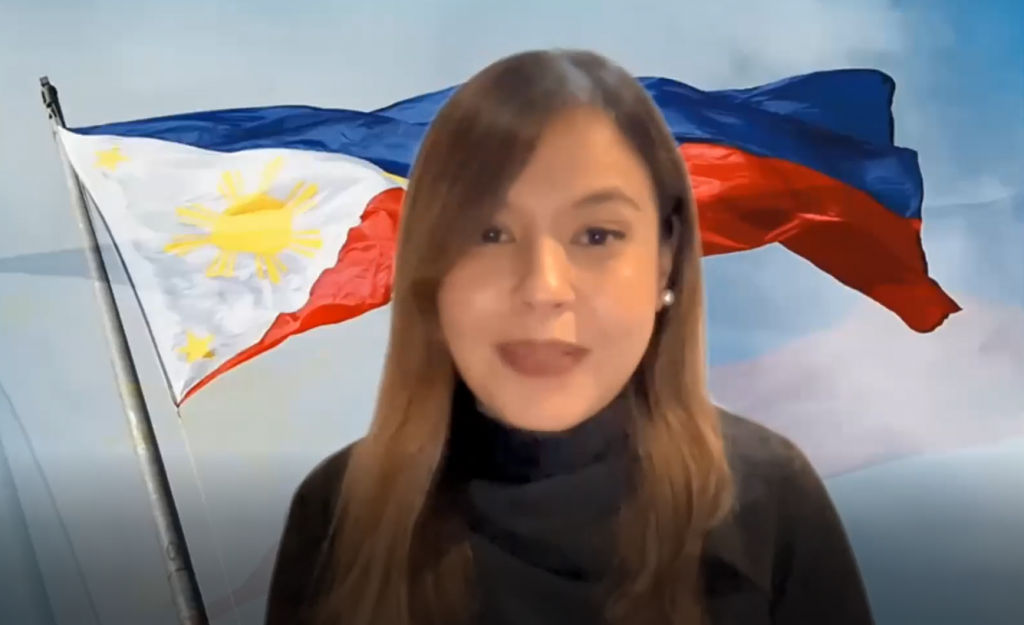
“The Commission is grateful for its alliance with you as notable partners in the GAD advocacy. Noting how culturally diverse and complex our communities are, it certainly is not an easy feat to address inequalities on the bases of sex and gender, however, you all showed the dedication and the right attitude to be in solidarity with marginalized sectors, especially women,” Yuzon-Chaves said.
Notable Local Programs to Exemplify
Creativity, culture, support, and women’s empowerment make up the formula of the outstanding local gender-responsive programs presented during the assembly.
A truly inspirational one is that of the Municipality of Abra De Ilog’s Likha Iraya which integrates gender sensitivity in the preservation of tradition and promotion of the indigenous people’s culture and welfare. Despite the challenges, such as the gender roles attached to women in their communities, the Manlalalang Iraya thrived, with the support of various government agencies and private partners in terms of product quality, marketing, and finances. From being an inheritance from their ancestors, the women’s weaves became trade fair staples, helped IP women feed their families, and served as paragons for others.
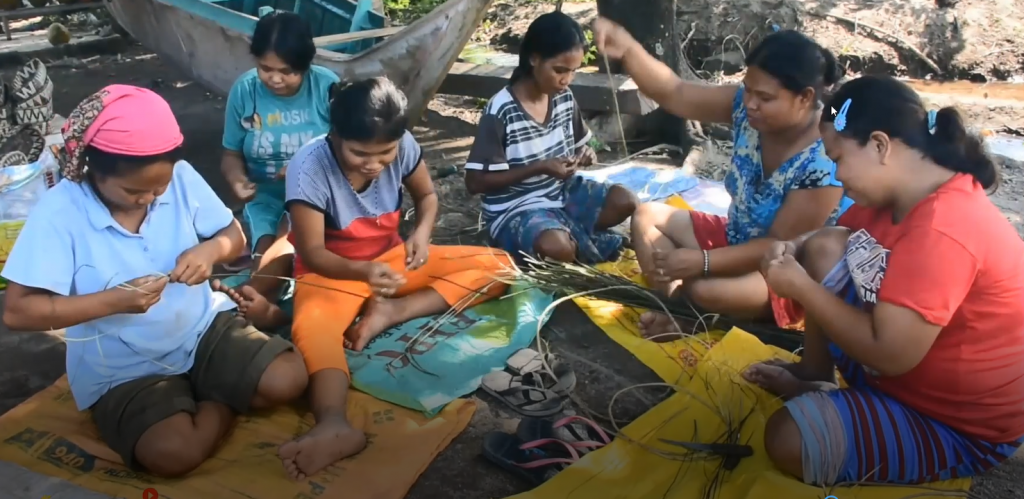
“Dahil nga po sa mga product na nagagawa nila, hindi lang sila nagsisilbing regalo o token, but iyong ibang agencies and other clients na gustong malaman pa, ano ba iyong pupwede nilang ma-adopt doon sa pagkakaroon ng gender advocacies and gender-related projects sa bayan ng Abra de Ilog na pwede nilang i-adopt sa kanila… so humihingi sila ng technical assistance from us para maging gender-sensitive sila,” shared Ms. Celeste A. Moreno, Public Information officer and GAD Focal Person of LGU Abra de Ilog in Occidental Mindoro.
For the Visayas, Baybay City in the Province of Leyte stood witness as to the impact that sex-disaggregated data can achieve. They apply the Barangay Managament Information System (BMIS), a data banking system, to have sex-disaggregated data as basis for appropriate intervention and also, to serve as a guide in planning for their community’s development. A program recognized by the PCW, the BIMS also emerged as a handy tool during the trying times — particularly the COVID-19 pandemic – serving as a basis in identifying recipients for assistance, contact tracing, and vaccination drive.
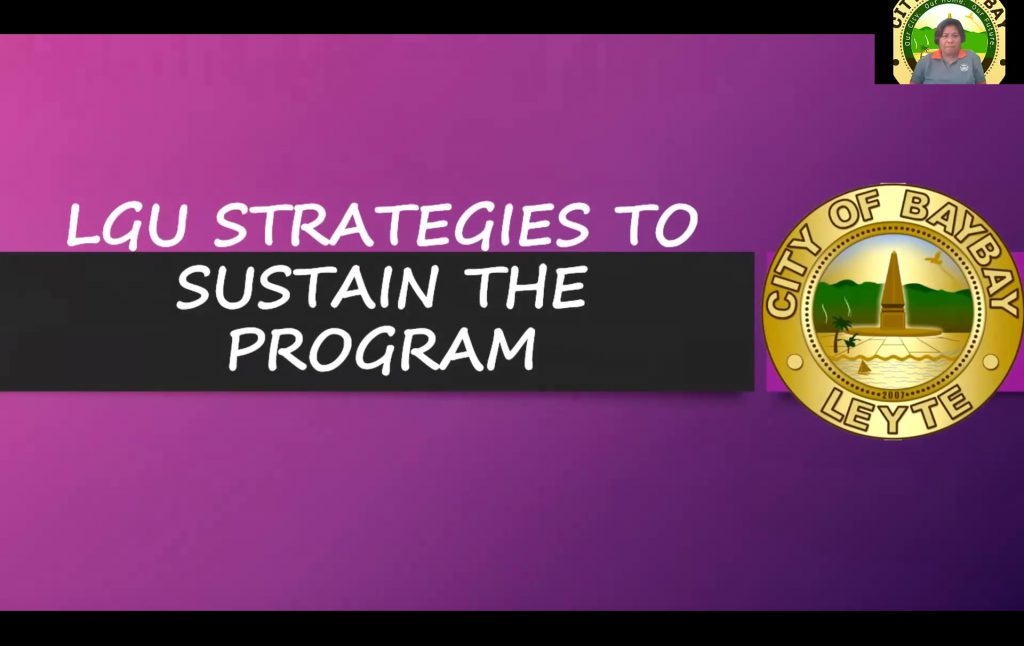
Another unique and noteworthy program is from Mindanao, Davao City’s Ray of Hope Village. Enabling women Persons Deprived with Liberty (PDLs) to “bounce back with pride and dignity”, the village is the only jail in the country with no cell bars but cottages in vibrant colors and decors. Called the “Bakasyonistas”, the PDLs here undergo the Therapeutic Community Modality Program, benefit from livelihood projects, learn behind bars, and are aided in their reintegration to the society upon release through after care. Once hailed as the female dormitory of the year nationwide, it also rose to be one of Davao City’s tourist destinations.
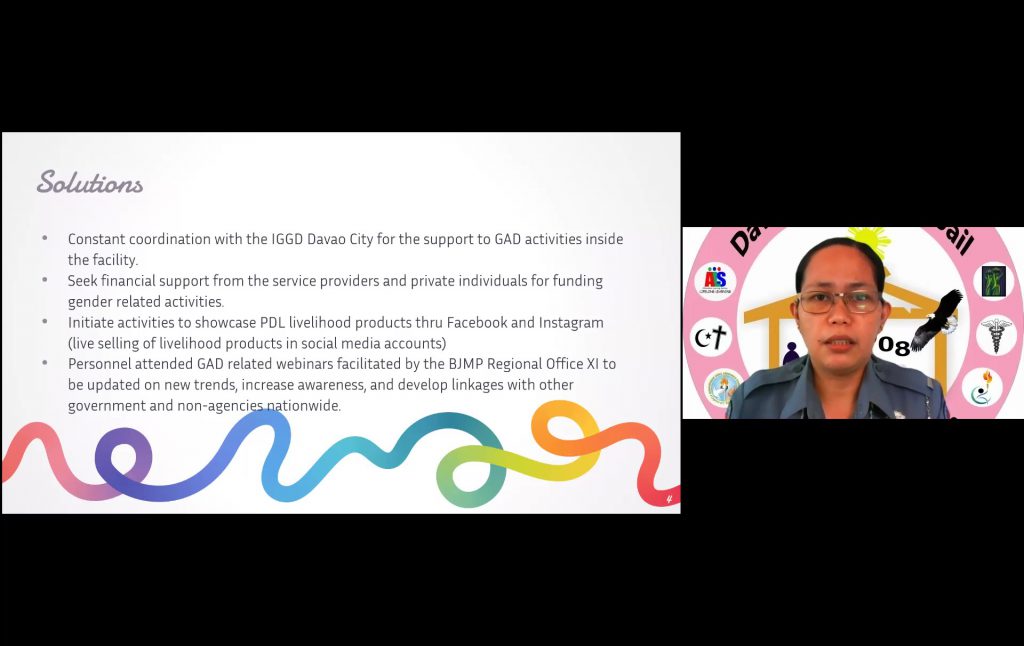
Ms. Cheryl Mae I. Torre, Jail Officer III and GAD Focal Person of the Ray of Hope Village Davao City- Female Dormitory, shared the challenges they had or continue to hurdle. Among these is the limited budget for GAD-related activities, addressed through coordination with the LGU and private partners. The COVID-19 pandemic also posed issues but they did not let it dishearten them. “Since pandemic, we initiated activities to showcase PDL livelihood products through… live selling of the products on social media accounts. Ito iyong isang challenge because before the pandemic, nasanay na sila na iyong mga nagagawa nilang products ay immediately sold dahil may mga LGUs na nagbibisita sa aming nationwide. Kaya naging alternative namin ay… through live selling,” she said.
Inspired? Learn how to be certified as GAD LLH
To be recognized as a GAD-LLH, proponents must follow the new certification guidelines. In her session on this, Ms. Nharleen Santos-Millar, Chief GAD Specialist of the PCW – Technical Services and Regional Coordination Division, provided a backgrounder on the certification program. Santos-Millar highlighted how the GAD LLHs serve as referral mechanisms for LGUs in providing technical assistance on GAD and how local government units can adapt GAD innovations from these hubs.
Currently, there are 12 LGUs with GAD LLHs, 22 total GAD LLHs, 5 pioneering LGUs (Provinces of Aklan, Iloilo, and Quezon and the Cities of Davao and Naga) for Batch 1, 7 certified in 2019 (Provinces of Misamis Occidental, Palawan, and Pangasinan; Cities of Baybay, Mabalacat, and Quezon; and Municipality of Abra de Ilog Abra de Ilog) for Batch 2.
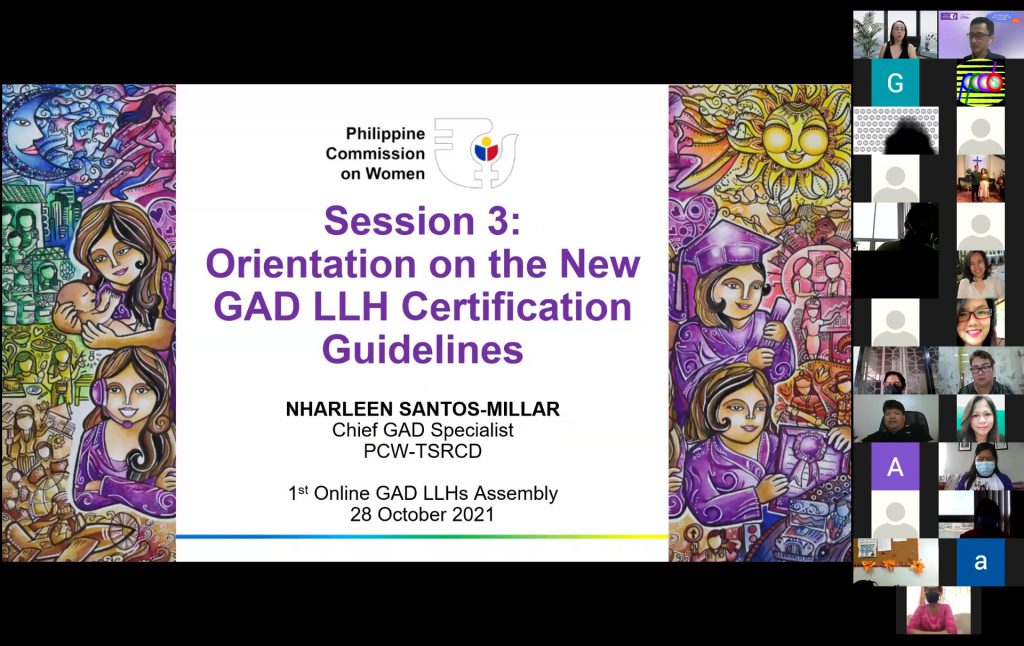
Ms. Santos-Millar also discussed the different GAD LLH Classifications and the step-by-step process of the certification, from the application, assessment, recognition, until the renewal and recertification. She explained the segments of the GAD LLH Profile Form which interested LGUs must accomplish and emphasized the validation process.
“Talagang bumababa kami, sa inyong local government units, we went down, we met with you, we met with your clients, we inspected your facilities, para makita namin, kung hindi lang in paper, kundi in actual practice maganda ang programa,” Santos-Millar enthused. PCW also monitors and evaluates all GAD LLH. “We also have to monitor whether you are maintaining the gender-responsiveness of your programs. We have to collect reports from the LLH, we can also interview and get feedback from your clients, and conduct M&Es,” she added.
Serving as a backbone of the collaboration, certified LLHs sign a partnership agreement (PA) with the PCW. Senior GAD Specialist, Mr. Pent Elyria Dawn V. Liongson, reoriented them on their roles and responsibilities under this PA, including sustaining the implementation of notable GAD efforts and sharing their expertise to other LGUs through the provision of technical assistance, learning sessions, and materials, among others. He also narrowed in on the need for the LGUs to provide feedback to PCW regarding the results of the services involved in their notable GAD efforts as well as to conduct a client satisfaction survey.
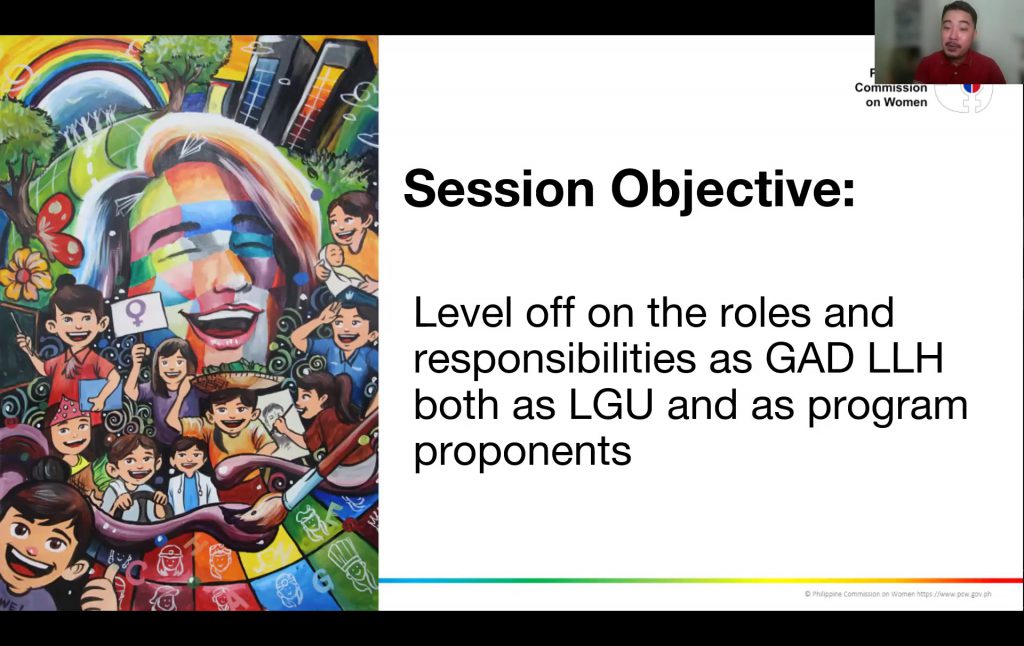
“Ang kagandahan, kapag na-monitor ng PCW kung ano ang TA ninyo, kung may makita man kaming kakulangan, ay pwede namin kayong matulungan… Importante ang client satisfaction survey kasi it’s also a way of getting the feedback of the people kung anong area pa ng service natin ang kailangan nating i-improve. Of course, we always have the commitment to give our excellent service,” Liongson stated.
But first, the basics: HGDG, GeRL Tool, and Roles of LLH
But to be certified as a GAD LLH, proponents must be accustomed to using gender analysis tools.
Senior GAD Specialist Ms. Elizabeth B. Omas-as walked them through the Harmonized Gender and Development Guidelines (HGDG) anew, spotlighting on how to apply the HGDG in their programs.
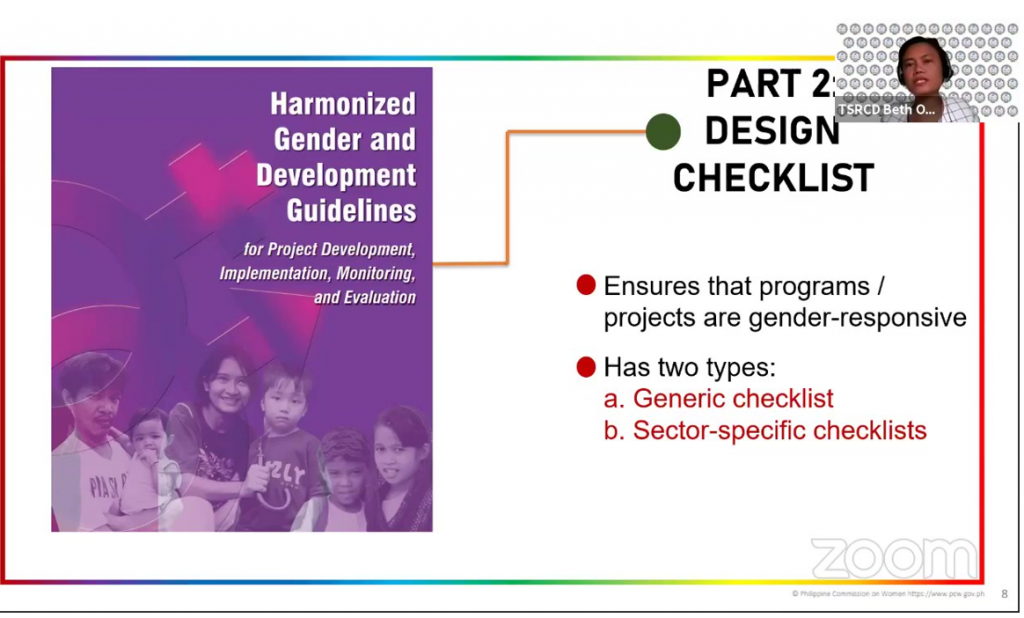
“As a tool, HGDG is used to make sure that all our programs, projects, and activities, undertaken by the government are gender-responsive across the various stages of the project cycle, from the identification, the planning proper, to the implementation, to the management of the implemented program, down to the monitoring and evaluation, “ Omas-as told the participants. She also took them through the PIMME checklist, providing guide questions and source documents related to each element.
After refamiliarizing with the HGDG, they delved deeper into the Gender-Responsive LGU (GeRL) tool, with the session of GAD Specialist Ms. Patricia Lloren C. Tuaño. She reviewed them on how the GeRL tool can aid LGUs in evaluating their gender responsiveness as an organization and in turn, lead to their respective LGUs delivering services and programs with a gender lens.
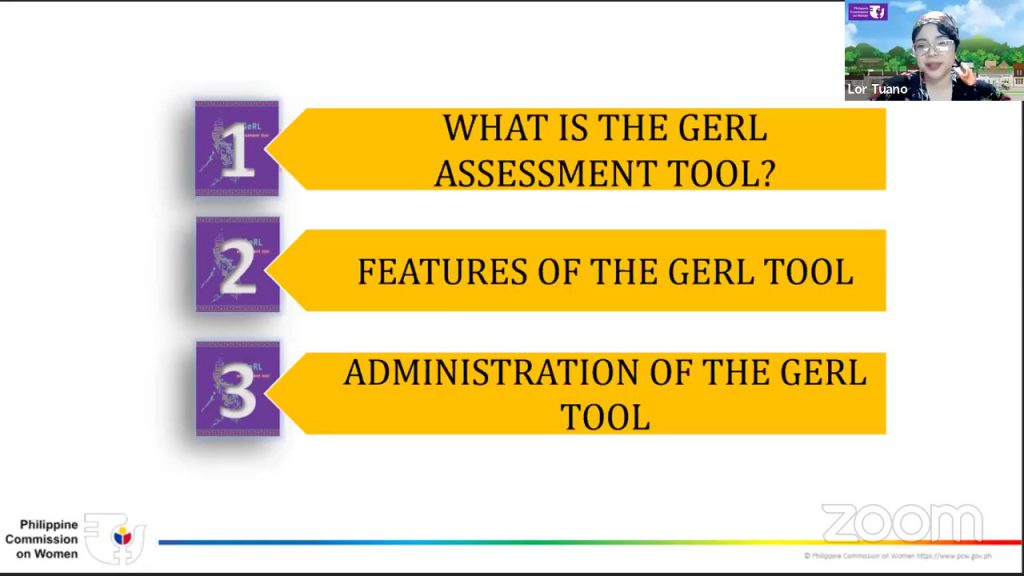
“Isa po talaga sa mga difficulties ng LGUs and agencies ay ang identification of gender issues. Iyong GeRL tool might help in addressing this problem or difficulty as it is also capable to help its constituents to see the gender gaps and gender issues that exist in the specific locality,” said Tuaño.
To conclude the interactive and informative assembly, PCW Deputy Executive Director for Operations Ms. Kristine Balmes encouraged the LLHs to aim for more in their GAD efforts.
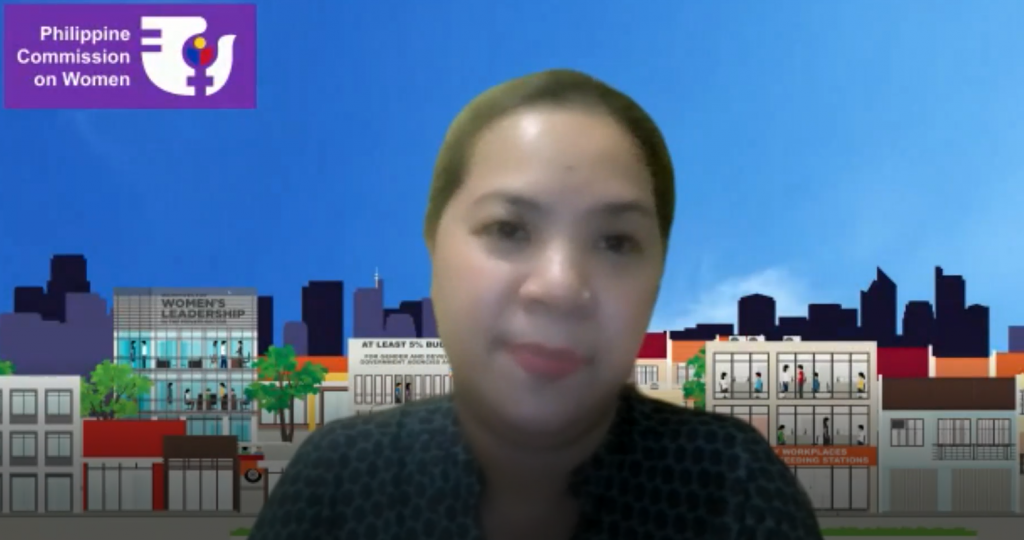
“This point was a manifestation of hope to not easily be fulfilled with our current good practices, instead, we bank on the challenges we were able to identify to address more gender-based issues and concerns. With this, we embolden you to be more proactive in shaping your other programs, projects and activities to be gender-responsive… Rest assured that the PCW is committed to providing you technical assistance on GAD and work closely alongside your LGUs to ensure that you are guided with your gender mainstreaming efforts.” Balmes said.
For more information on the GAD Local Learning Hubs, click here.

